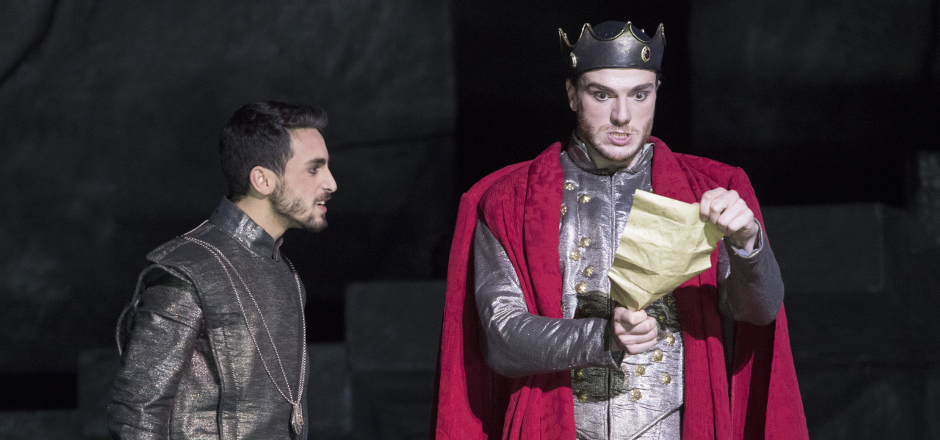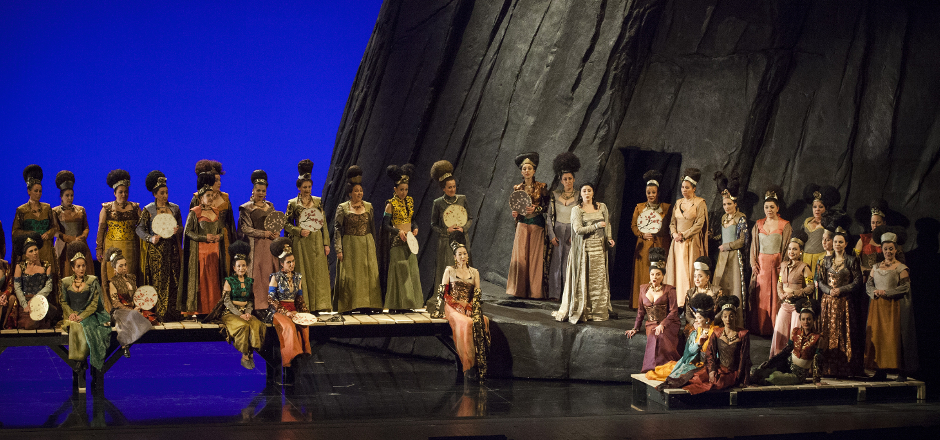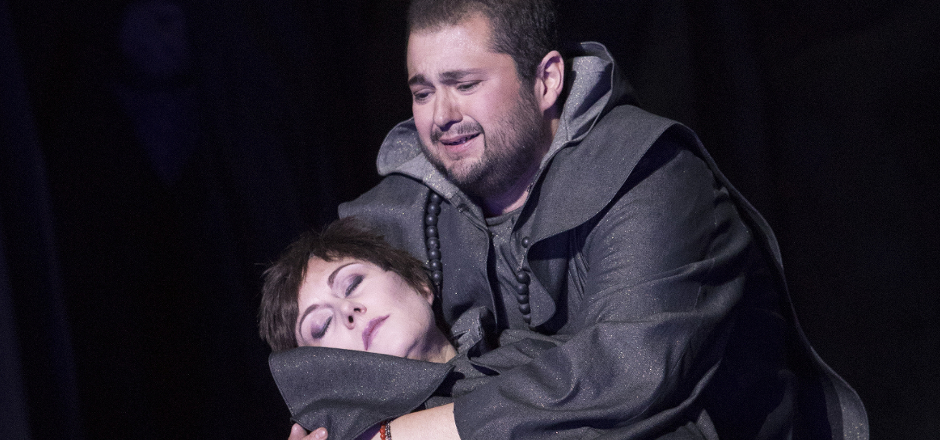Lyric Season 2017/18
Opera
La favorite
Gaetano Donizetti
La favorite
Opera in four acts by Alphonse Royer, Gustave Vaëz and Eugène Scribe
Music by Gaetano Donizetti
From Les Amours malheureuses ou le Comte de Comminges by Baculard d'Arnaud (1790)
First performed: 2 December 1840 at Opéra de Paris, Paris
Staging of the Grand Teatre del Liceu in Barcelona
A coproduction with Gran Teatre del Liceu and Teatro Real di Madrid
First performance in Florence in the original French version
Artists
Conductor
Fabio Luisi
Director
Ariel García Valdés
Codirector (2018)
Derek Gimpel
Scenes and costumes
Jean-Pierre Vergier
Light design
Dominique Borrini
Orchestra and Choir of the Maggio Musicale Fiorentino
Choir director
Lorenzo Fratini
Fabio Luisi
Director
Ariel García Valdés
Codirector (2018)
Derek Gimpel
Scenes and costumes
Jean-Pierre Vergier
Light design
Dominique Borrini
Orchestra and Choir of the Maggio Musicale Fiorentino
Choir director
Lorenzo Fratini
Leonor de Guzman
Veronica Simeoni
Fernand
Celso Albelo/Anton Rositskiy (3/03)
Alphonse XI
Mattia Olivieri (22, 25, 28/02)
Vito Priante (03/03)
Balthazar
Ugo Guagliardo
Ines
Francesca Longari
Don Gaspar
Manuel Amati
Un Seigneur
Leonardo Sgroi
Veronica Simeoni
Fernand
Celso Albelo/Anton Rositskiy (3/03)
Alphonse XI
Mattia Olivieri (22, 25, 28/02)
Vito Priante (03/03)
Balthazar
Ugo Guagliardo
Ines
Francesca Longari
Don Gaspar
Manuel Amati
Un Seigneur
Leonardo Sgroi
In the monastery of Santiago de Compostela. The monks are entering the chapel, followed by the Father Superior Balthazar and the novice Fernand, who is about to take his vows. Balthazar notices that the young man is hesitating and asks the reason. Fernand replies that his faith has been wavering since once in the church, a woman lovely as an angel kneeled to pray beside him. Since then, whenever he prays to God, he sees the woman’s image and dreams of a destiny outside of the monastery walls. In vain, Balthazar tries to dissuade him, revealing that he was considering him as his successor and warning him of the dangers of the outside world. Instead Fernand insists that he must abandon religious life because he’s in love with the mysterious woman, of whom he knows neither name or condition. At this Balthazar refuses to bless him, and predicts that one day he will return repented and hopes that God will not curse him. Fernand puts his trust in the woman he loves to watch over him and leaves the monastery.
On the beach of the island of Léon. Inès, confidant of Léonor, the favorite of the King, sings and dances with her friends while awaiting the boat that will bring Fernand, who has been blindfolded, ashore. In vain, he asks Inès to reveal the name of her mistress, but she replies that “it’s a secret of the Lady”. Léonor arrives and the two exchange words of love. Upon his request to know her name, she implies that he shouldn’t ask, and when he asks her to marry him, she tells him that although she desires him, she cannot accept. She then hands Fernand a document; he will have a glorious future but in return must renounce her. Inès enters to announce the arrival of the King of Castile, Alphonse XI. Now Fernand believes he knows why she cannot marry him: she is a lady of high rank while he is just a young stranger. As he reads the text he realizes that he has been nominated captain, feeling hopeful that he will be able to gain his beloved's hand after he returns triumphantly from the war.
Act II
In the Alcazar Palace of Seville. Alphonse and his officer Don Gaspar are discussing their great victory in the war against the Moors, in particular the heroic acts of Fernand, whom the King plans to honor before the entire court. Gaspar announces the arrival of an important message from the Pope, but the King is lost in his thoughts. The courtiers, instigated by Rome, are conspiring against Léonor, but he is determined to defend his lover at all costs. Gaspar is ordered to prepare a grand feast. Léonor enters: she has learned from Inès of Fernand’s victories and expresses to the King her shame and pain for having caused the displeasure of the court as his lover and no longer can bear this condition. Alphonse urges her to have patience: she will soon know what her King has planned for her and invites her to participate by his side at the party. As the ceremony begins, Gaspar delivers a note to the King addressed to Léonor. In anger Alphonse turns to her, and she confesses that she loves another, without revealing his name. Their conversation is brusquely interrupted by the arrival of Balthazar, the Pope’s messenger, who curses the adulterous couple and threatens to excommunicate the King if he repudiates his Queen for his ‘favorite’. Alphonse refuses to give in claiming his royal power, while Léonor asks him to revenge her honor. Balthazar exhibits the papal bull ordering the excommunication of the King; Léonor must be banished immediately. Upon hearing Balthazar’s words, the court takes up the call to send her away.
Act III
In the Alcazar Palace of Seville. Alphonse praises and thanks Fernand for his valor in battle and asks him what he would like as a prize. The young man replies that his is in love with a noblewoman and asks the King to consent to their marriage. Alphonse agrees and wants to know who the young woman is: in that moment Léonor enters the room and Fernand indicates her. Alphonse is stunned but immediately makes cynical political calculations and grants his assent to their marriage, with the dual purpose of taking revenge on Léonor and ending his controversies with the Pope. He urges the young woman to return Fernand’s love and declares that they will be wed within the hour. Fernand, unaware of his beloved’s past is feeling full of joy, while Léonor is filled with anguish: she cannot accept that her betrothed is to be disgraced in the eyes of the court because of her relationship with the King. Even though she loves Fernand with all her heart, she cannot bear to burden him with her dishonor. She instructs Inès to reveal to the young man that she was the King’s lover and that she will understand if he rejects her, but should he forgive her, she will love him to the death. However before she can speak to Fernand, Inès is arrested by Don Gaspar and the wedding ceremony begins. The King gives Fernand the title of Marquis along with the collar of the noble order. When Léonor arrives, he welcomes her with affectionate words, leading her to believe that he has forgiven her. The marriage is concluded among the sarcastic comments of the courtiers, convinced that that the young man has agreed to marry the lover of the King for his own advantage, thus saving the King from excommunication. Fernand invites the court to share his happiness, but they respond with disdain and refuse to shake his hand. He rushes at them violently to revenge the offense but is stopped by the sudden arrival of Balthazar who is informed of the marriage, then reveals to Fernand that he has married the lover of the King Alphonse. The young man is shocked by the unexpected news and turns to Alphonse with words of pride and indignation, accusing him of deceiving him and condemning him to a life of dishonor. He refuses the title of Marquis, throws the noble collar to the ground and breaks his sword at the King’s feet. Alphonse considers punishing his insolence but, aware of his own guilt, he renounces his revenge and lets Fernand leave with Balthazar.
Act IV
In the monastery of Santiago de Compostela. The monks are busy digging graves, while Balthazar urges some pilgrims to pray. He then turns to Fernand, who is once again about to take his vows and confides that he has returned to the monastery to find inner peace. Balthazar invites him to turn his thoughts only to God, then leaves him: he must rush to a gravely ill young novice who has just arrived at the monastery. Left alone, Fernand’s thoughts return to Léonor: he loved an angel who he believed to be pure, but his dream of happiness dissolved in a fatal lie. He prays to God to help him forget the past and goes into the chapel to take his vows. Léonor enters disguised as a novice: she is dying and seeks Fernand to receive his forgiveness but overhears his voice as he consecrates himself to God. She tries to flee but is too weak and collapses to the ground. Fernand exits the church and recognizes her, angrily telling her to go back to the King where she can cover herself with gold and shame. But she defends herself: she didn’t mean to deceive him, she was sure that Inès had accomplished her mission and that he had married her in spite of her past. She seeks his forgiveness, wishing to be able to go to heaven free from his contempt. Fernand feels his love for Léonor reawakening and begs her to leave with him, but she dies in his arms. Balthazar asks the monks to pray for the novice and Fernand asks them to pray for his soul when he too, leaves the earthly realm.
Nasce a Bergamo il 29 novembre 1797. Di umili origini, riceve i primi insegnamenti musicali alle Lezioni Caritatevoli di Musica di Giovanni Simone Mayr. Dopo un periodo di perfezionamento al Liceo Musicale di Bologna, esordisce nel 1818 con Enrico di Borgogna, per la riapertura del Teatro San Luca di Venezia. Nel 1822 diviene direttore del Teatro San Carlo di Napoli, ruolo che deterrà fino al 1833. Sono anni di frenetica attività compositiva, testimoniati da capolavori come Anna Bolena (1830), L’elisir d’amore (1832), Lucrezia Borgia (1833), Lucia di Lammermoor(1835), Maria Stuarda (1835), Roberto Devereux (1837). Nel 1835 Gioachino Rossini lo invita a Parigi, dove debutta al Théâtre Italien con Marin Faliero: è la consacrazione internazionale e l’inizio del prolifico legame con la capitale francese per cui compone anche La Fille du régiment (1840) e Don Pasquale (1843). L’8 aprile 1848, reso folle dalla sifilide, muore a Bergamo.
FABIO LUISI
Nato a Genova, attualmente Direttore stabile (General Music Director) al Teatro dell’Opera di Zurigo e Direttore Principale della Danish National Symphony Orchestra di Copenaghen, è il Direttore Musicale designato del Maggio Musicale Fiorentino e inizierà il suo incarico nell’aprile 2018. Dal 2011 al 2017 è stato Direttore Principale del Metropolitan Opera House di New York, nonché Direttore Principale dei Wiener Symphoniker (2005-2013), della Staatskapelle di Dresda (2007- 2010), dell’Orchestre de la Suisse Romande a Ginevra (1997-2002), dell’Orchestra del Mitteldeutscher Rundfunk di Lipsia (1999-2007) e dei Tonkünstler di Vienna (1995-2000). Dal 2015 è Direttore Musicale del Festival della Valle d’Itria a Martina Franca, un Festival al quale è stato legato fin dagli inizi della sua carriera. Dirige stabilmente nei maggiori Teatri d’opera del mondo (Teatro alla Scala di Milano, Covent Garden di Londra, Opéra di Parigi, Liceu di Barcellona, Bayerische Staatsoper di Monaco, Lyric Opera di Chicago) ed è ospite delle migliori orchestre (fra cui, Cleveland Orchestra, Philadelphia Orchestra, San Francisco Symphony, Concertgebouw Orkest, London Symphony Orchestra, Wiener Philharmoniker, Filarmonica della Scala, NHK Orchestra Tokyo). Ha al suo attivo numerose registrazioni, fra cui l’integrale delle Sinfonie di Robert Schumann, di Arthur Honegger e di Franz Schmidt, poemi sinfonici di Richard Strauss, opere di Verdi, Bellini, Donizetti, Rossini, Strauss, Wagner e Berg. Per il DVD di Siegfried e Götterdämmerung con i complessi del Metropolitan di New York ha vinto un Grammy Award e per la registrazione della Nona Sinfonia di Anton Bruckner con la Staatskapelle di Dresda ha vinto un Premio Echo-Klassik. Numerose le onoreficenze ricevute, fra le quali il premio Abbiati, l’Anello d’oro dedicato ad Anton Bruckner dei Wiener Symphoniker, il Grifo d’Oro della città di Genova, la Laurea honoris causa dell’Università di San Bonaventure (Stati Uniti), l’Ordine della Repubblica Austriaca per Scienze ed Arti. È Cavaliere della Repubblica Italiana e Commendatore dell’Ordine della Stella d’Italia.
ARIEL GARCIA-VALDÈS
Uomo di teatro, regista e attore, ha partecipato ad una delle più significative avventure collettive del teatro francese al Centre Dramatique National des Alpes dal 1975 al 1986, guidato da Georges Lavaudant, storico direttore del Théâtre de l’Odéon di Parigi. Questa avventura si è conclusa con l’interpretazione del ruolo del protagonista in Riccardo III di Shakespeare,
realizzato nella cour d’honneur del Festival di Avignone e risultato uno dei più grandi successi nella storia della manifestazione. Direttore del Centre
Dramatique National des Alpes dal 1988 al 1990, ha firmato oltre 30 regie nelle maggiori istituzioni teatrali di Francia e Spagna e numerosi spettacoli
lirici all’Opéra de Paris, all’Opéra de Monte-Carlo, al Liceu di Barcellona, alla Zarzuela e al Real di Madrid e nei teatri di Losanna, Strasburgo e Granada. All’Odéon di Parigi, ha ripreso, a partire dal 2004, l’attività di attore con 3 spettacoli che hanno segnato la vita teatrale francese e nei quali ricopriva ruoli da protagonista: Riccardo III ne La rose et la hache, Amleto in Hamlet, un songe e Valmont in Quartett di Heiner Müller, dove divideva la scena con Isabelle Huppert per la regia di Robert Wilson (ottobre-novembre 2006): spettacoli questi che sono stati rappresentati nei più grandi teatri di prosa europei. Ha recitato poi al Théâtre de la Madeleine di Parigi ne L’amante anglaise di Marguerite Duras, con André Wilms e Ludmila Mikaël (maggio-luglio 2009) e ha ripreso, nel novembre 2009, Quartett di Heiner Müller sempre con Isabelle Huppert e la regia di Robert Wilson a New York. Nel 2016, ha recitato all’Odéon di Parigi in Ivanov di Čechov per la regia di Luc Bondy e nel 2017, sempre all’Odéon, ha tenuto una serie di letture pubbliche di Bérénice di Racine con Isabelle Adjani e la regia di Georges Lavaudant.
DEREK GIMPEL
Nato a Berlino, inizia la sua carriera di regista alla Staatsoper Unter den Linden. Ha firmato regie e riprese di oltre 80 opere nei più importanti teatri internazionali, fra cui: Teatro Real di Madrid, Opéra Garnier e Théâtre de Champs-Élysées di Parigi, New National Theatre di Tokyo, Finnish National Opera di Helsinki, Gran Teatre del Liceu di Barcellona, National Opera di Varsavia, La Scala di Milano, Israeli Opera di Tel Aviv, Opere di Zurigo e Lipsia e il Festival di Salisburgo. Scrive numerosi articoli e saggi per i programmi di sala e ha tenuto workshops per giovani cantanti nei conservatori di Berlino, Londra e Tokyo. Ha curato la regia del suo adattamento de Le convenienze ed inconvenienze teatrali di Donizetti, che ha debuttato con la Dresdner Philharmonie diretta da Michael Sanderling. La sua recente produzione di Don Carlo di Verdi al Teatro Nazionale di Zagabria è stata candidata come migliore opera del 2017 in Croazia. Derek Gimpel è stato invitato a tornare alla Staatsoper di Berlino per creare una nuova produzione dell'opera Punch and Judy di Harrison Birtwistle, accolta con favore dal pubblico. Tra i progetti futuri, un nuovo allestimento di Kát'a Kabanová di Leoš Janáček per il Grange Festival e una produzione semi-scenica di Fidelio di Beethoven.



